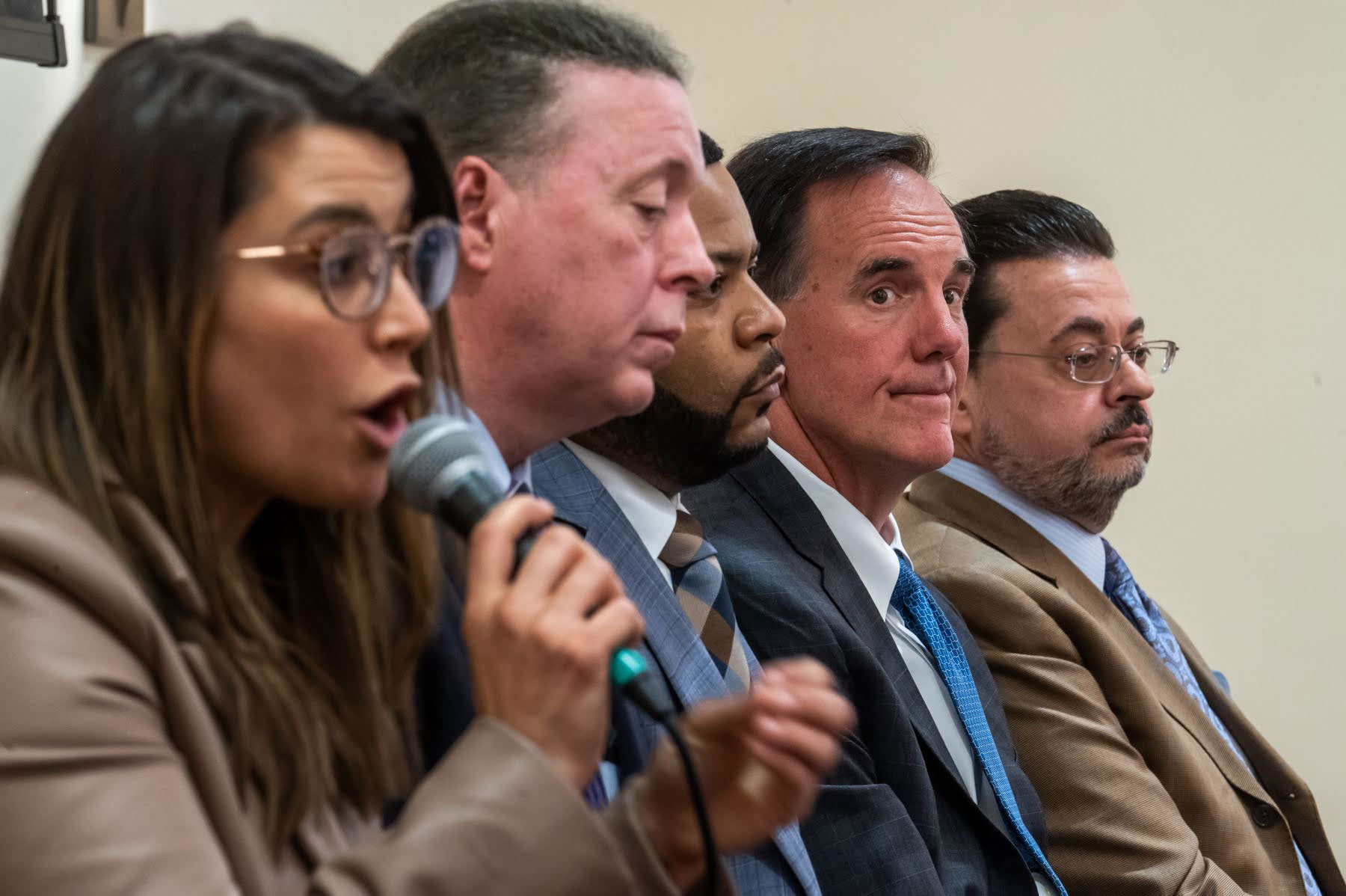Pictured from left are county executive candidates Sara Innamorato, Michael Lamb, Will Parker, Joe Rockey, and John Weinstein. (Photo by Stephanie Strasburg/PublicSource)
Update (5/8/23): John Weinstein raised $1.35 million from Jan. 1 through April 30 toward his county executive bid, according to a filing submitted late Monday. The sum makes him the best-funded candidate for executive, ahead of three rivals who each raised between $600,000 and $800,000 during that period. The filing was approximately three days past the Friday evening deadline set by state law, which Weinstein’s campaign blamed on a technological issue. Nearly all (99%) of his contributions came in amounts greater than $250. Six-figure contributions included $100,000 from the International Union of Operating Engineers Local 66 Political Action Committee, $100,000 from the Steamfitters Local 449 PAC, and $100,000 from Eric Yonke, of Upper St. Clair, who is an executive of Suncap Property Group, which owns a Bethel Park apartment complex.
Reported 5/5/23: Millions of dollars are flooding the campaign for Allegheny County executive, new disclosures showed Friday. As six Democrats spent the first four months of 2023 angling for the party nomination to replace Rich Fitzgerald in the region’s highest office, they took in donations from grassroots, small-dollar donors as well as labor unions, business people and allied politicians, while some poured personal funds into their electoral bids.
The executive candidate who raised the most campaign money last year, county Treasurer John Weinstein, did not meet the 5 p.m. deadline for disclosing contributions received and expenditures. He entered the year with $481,000 in his account, and in February announced that his campaign had raised more than $1 million to date. But voters will have to wait to find out who has paid into his campaign since Jan. 1.
Three other Democrats each raised well into six figures this year:
- State Rep. Sara Innamorato collected $843,000, built largely on contributions from service worker unions and the activist organization Pennsylvania United, along with a dose of small-dollar fundraising. Her campaign reported receiving nearly $69,000 from donors who gave $250 or less, but also contributions of $105,000 from the PAC of advocacy group PA United, $100,000 from the Service Employees International Union [SEIU] Local 668’s PAC, and $95,000 from SEIU Healthcare’s campaign arm.
- City Controller Michael Lamb raised $628,000, including $75,000 from Fitzgerald’s campaign war chest and $77,000 in loans from Lamb himself to his campaign.
- And attorney Dave Fawcett raised $630,000, including $350,000 in loans from himself. Going back to December, Fawcett has put half a million dollars of his own wealth into his run.
In a press release, Weinstein’s campaign blamed the delay on “a technological failure” and pledged disclosure to the county Monday morning. State law calls for modest fines against campaigns that fail to meet disclosure deadlines, capping them at $250.
The only candidate on the Republican ballot, former PNC executive Joe Rockey, reported raising about $209,000 in 2023, almost half borrowed from the candidate’s personal wealth.
Campaigns are not always won by the highest bidder; recent high-profile primaries for Pittsburgh mayor and U.S. House were won by candidates who were outspent. But television ads and direct mail, and the name recognition they offer candidates, can be a critical boost in a crowded field.
The four candidates with the most funding — Weinstein, Fawcett, Lamb and Innamorato — have each invested big chunks of their cash in TV ads. Some candidates are seeing outside groups purchase ads on their behalf. The Working Families Party PAC has purchased airtime for ads supporting Innamorato, and Fitzgerald’s campaign has bought slots for pro-Lamb ads, according to FCC records.

